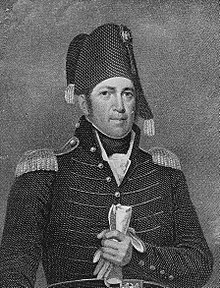Jacob Brown
| Jacob J. Brown | |
|---|---|

Major General Jacob J. Brown
|
|
| Nickname(s) | "Potash Brown" |
| Born |
May 9, 1775 Bucks County, Pennsylvania |
| Died | February 24, 1828 (aged 52) Washington, D.C. |
| Place of burial | Washington, D.C. |
| Allegiance |
|
| Service/branch |
|
| Years of service | 1807 – 1813 (NY Militia) 1813 – 1828 (US Army) |
| Rank |
|
| Commands held |
Army of the Niagara 1st Commanding General of the United States Army |
| Battles/wars | |
Army of the Niagara
11th Senior Officer of the United States Army (later Commanding General of the United States Army)
Jacob Jennings Brown (9 May 1775 – 24 February 1828) was an American army officer in the War of 1812. His successes on the northern border during that war made him a hero. In 1821, he was appointed Commanding General of the United States Army and held that post until his death.
Born in Bucks County, Pennsylvania, Jacob Jennings Brown was the son of Samuel and Abi (White) Brown. His middle name was given to him in honor of his paternal grandmother who was a descendant of Samuel Jennings, the latter having been a deputy governor of West Jersey and later receiver general of Pennsylvania in the early 18th century.
Raised a Quaker, Brown graduated from the University of Pennsylvania in 1790. He taught school and, in 1798, moved to upstate New York. There he was a pioneer settler and landowner in the Black River country and helped open the area up for further settlement. He and his extended family established mills and a store, laid out roads and improved navigation on the lower Black River.
One biographer claimed that Brown received his earliest military training when he was a military secretary to Alexander Hamilton during the winter of 1798-99, while Hamilton was organizing the U.S. Army for possible war with France. However, Hamilton's biographies state he did not have a secretary. Biographical sketches of Brown published in 1815 do not mention a connection between him and Hamilton.
In 1807, as one of the leading citizens of his county, Brown was commissioned as a captain in the 108th regiment of the New York Militia. Two years later, he was promoted to colonel. His initial commission was the result of regional political connections. However, his promotion to higher rank appears to have resulted from his aversion to frequent and expensive military parades in times of peace. On the frontier, it was time-consuming and expensive for scattered members of the militia to assemble for drill or other activities when they had farming and other occupations that demanded their time.
...
Wikipedia
